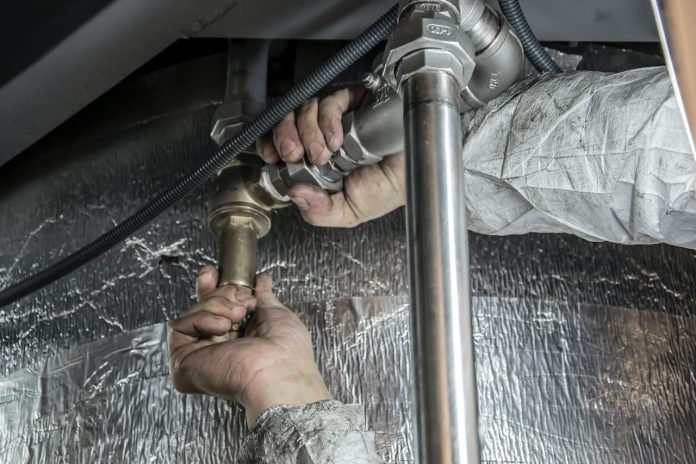The plumbing system is one of the most essential components of any home, responsible for delivering clean water and efficiently removing waste. Although modern plumbing systems are designed to last for decades, they can still develop issues that require timely repair or replacement. Over time, plumbing can face various challenges that may affect the comfort and safety of your household. For this reason, it’s important to familiarize yourself with the following six common plumbing problems that homeowners frequently encounter:
1. Hard Water Stains
Hard water contains high levels of minerals such as calcium and magnesium, which accumulate and form deposits known as scale on your fixtures and pipes. These hard water stains are not only difficult to remove but can also cause long-term damage by clogging pipes and reducing water flow. If you notice stubborn white or rusty stains around faucets, sinks, or appliances, it’s important to schedule a professional plumbing inspection.
Identifying hard water stains alone may not provide a full picture of the plumbing health. Watch for additional indicators such as:
- Fluctuating water pressure
- Water discoloration or cloudiness
- Corroded or rust-colored faucets and fixtures
2. Clogged Pipes
Over time, pipes can become clogged due to the buildup of hair, grease, soap scum, and other debris, significantly reducing water flow. While many clogs can be addressed using a plunger or a plumber’s snake, persistent blockages may require professional intervention. Newer homes rarely experience severe clogs unless foreign objects like toys or jewelry have been flushed down the toilet.
Chronic clogs usually develop over many years, especially in older homes. It’s essential to inspect pipe joints, taps, and valves regularly as blockages can occur there as well. If you notice continuous changes in water flow or recurring clogs, a professional plumber can use advanced tools like plumbing cameras to diagnose the problem accurately.
3. Water Heater Issues
Water heaters, especially gas models, may sometimes experience the pilot light going out, leading to a lack of hot water. When this happens, follow the manufacturer’s instructions to safely relight the pilot light. Unusual noises coming from your water heater, such as rumbling or popping sounds, are usually caused by sediment buildup at the bottom of the tank.
The accumulated sediment can act as insulation, causing the water to overheat and produce boiling noises. Flushing the water heater periodically, as recommended in the owner’s manual, helps remove sediment and prolong the life of your water heater.
4. Low Water Pressure
Experiencing low water pressure in only one area of your home is uncommon and often signals a localized problem such as a leak or blockage in the plumbing line. To determine the cause, it’s advisable to contact a licensed plumber who can properly diagnose and resolve the issue.
Check with your neighbors to see if they are experiencing similar water pressure problems. If not, then the issue likely resides within your home’s plumbing system, possibly due to disconnected pipes or a malfunctioning pressure regulator.
5. Blocked Faucets and Showerheads
Mineral deposits caused by hard water can accumulate inside faucets and showerheads, restricting water flow and reducing efficiency. A simple and effective DIY method to clear blockages is to unscrew the affected fixture and soak it overnight in vinegar. This can dissolve mineral buildup and restore water pressure. Don’t mistake reduced flow rates for reduced service from your water supplier without first inspecting your own fixtures.
6. Strange Toilet Noises
A loud booming or banging noise emanating from your toilet tank often signals a blockage in your sewer line or a loose clean-out plug. While these sounds can be subtle initially, paying close attention can help you catch the issue before it worsens. It is vital to promptly call a professional plumber if you notice these noises to prevent potential plumbing failures and costly repairs.
Bottom Line
Many plumbing issues are not instantly apparent, making it crucial to stay informed about common signs and symptoms. Regular inspections by a professional plumber can help ensure your system remains reliable and functional. Additionally, educating yourself on how to identify early warning signs and basic troubleshooting techniques will empower you to address minor issues before they escalate into costly repairs.
Beyond the issues discussed, developing a routine maintenance plan, including checking for leaks and monitoring water quality, can greatly extend the lifespan of your plumbing system and preserve the value of your home. Remember, early detection and professional upkeep are key to a stress-free and efficient plumbing system.
If you want to learn more about How Do You Handle a Plumbing Emergency, explore our detailed resources in the Bathroom category for expert insights and tips.

























